Training
Upcoming Training & Webinars
Our training streams include qualitative evidence synthesis, scoping reviews and rapid reviews, Cochrane methodology, mixed methods and more.
september 2025
18sep10:00 amIntroduction to Systematic Reviews (Online)10:00 am ONLINE
Event Details
This workshop will be held over four mornings and provides authors, at the beginning of the systematic review process, with a clear understanding of how systematic reviews of the effects
Event Details
This workshop will be held over four mornings and provides authors, at the beginning of the systematic review process, with a clear understanding of how systematic reviews of the effects of interventions are planned and conducted. It offers an insight into the development of a protocol, introducing participants to methodology, search methods, data extraction, risk of bias assessment and meta-analysis. While the focus is on systematic reviews of the effects of interventions, the principles discussed are likely to be useful to inform steps and approaches in other types of reviews.
Date: 18th, 19th, 24th & 25th September 2025
Time: 10.00am – 1.00pm
Places: 25 available for individuals who are resident on the island of Ireland
Fee: General €150; Student €80
Skill level: Introductory
Target Audience: Healthcare professionals, academics, researchers, policy makers and other decision makers, and Evidence Synthesis Ireland fellows who have identified a systematic review of effects of interventions topic and are ready to begin working on their protocol.
Prerequisites: A basic knowledge of health research. Interested in learning more on the methods of a systematic review of effects of interventions.
Teaching strategies: The workshop will consist of a mixture of short presentations led by members of the Evidence Synthesis Ireland and Cochrane Ireland teaching faculty, covering each of the stages of developing a systematic review protocol, small group activities and plenary discussions, providing participants with the opportunity to develop and refine their protocol. Although focusing on systematic reviews of the effects of interventions, the principles are likely to apply to other review types. This course will include blended learning with two months free access to Cochrane Interactive Learning self-directed learning modules, a number of which will be required study prior to the workshop.
Facilitators
Dr Augusto Azuara-Blanco, Clinical Professor of Ophthalmology, Queens University of Belfast.
Ciara Gleeson, Clinical Specialist Physiotherapist, Respiratory Assessment Unit, St. James’s Hospital, Dublin.
Dr KM Saif-Ur-Rahman, Senior Methodologist, Evidence Synthesis Ireland & Research Fellow, University of Galway.
*If your type of ticket is sold out, please join the waitlist or contact us at esi@universityofgalway.ie
more
Additional Information
Click HereRegistration
Click HereTime
(Thursday) 10:00 am
Location
ONLINE
Event Details
To register, CLICK HERE This webinar will present findings from a Study Within A Review (SWAR) evaluating the use of PubReMiner, a text-mining word frequency tool,
Event Details
To register, CLICK HERE
This webinar will present findings from a Study Within A Review (SWAR) evaluating the use of PubReMiner, a text-mining word frequency tool, for developing systematic search strategies used in various evidence syntheses. Conducted within the Health Information and Quality Authority’s (HIQA’s) Health Technology Assessment Directorate, the study compares the sensitivity and precision of PubReMiner-generated strategies to conventional methods used at HIQA. The session will outline the methodology, key outcomes, and considerations for incorporating such tools into systematic and rapid review processes. The SWAR was embedded across multiple reviews, offering insights into the advantages and disadvantages of this approach to answering methodological research questions compared to SWARs embedded within a single review. The webinar is particularly relevant for researchers, information specialists, librarians and others involved in evidence-based practice or policy who are interested in the evaluation of emerging approaches to literature searching.
Speaker:
Andrew Dullea is a Health Services Researcher within the Health Technology Assessment (HTA) Directorate in HIQA. Andrew previously qualified as a radiation therapist and worked for several years at St. Vincent’s Private Hospital where he led on the clinical implementation of surface guided radiation therapy (SGRT) and ‘tattoo-less’ radiotherapy. He later graduated from the University of Cambridge with a master’s degree in Public Health, and subsequently worked for the Health Products Regulatory Authority (HPRA) where he focused on the development and implementation of medical device and in-vitro diagnostic (IVD) health policy. Currently, Andrew works in the HTA Directorate’s ionising radiation evidence review team which deals with generic justification and the development of guidelines for exposures in asymptomatic individuals. He is also undertaking a PhD through the SPHeRE programme at the School of Medicine in Trinity College Dublin.
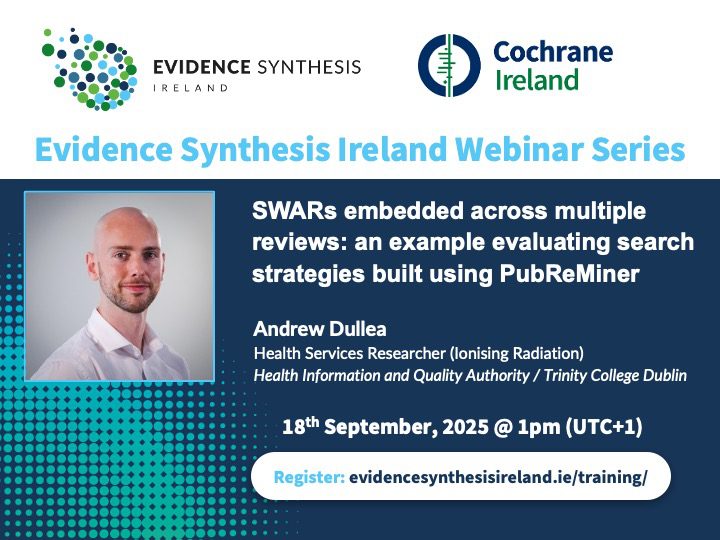
more
Registration
CLICK HERETime
(Thursday) 1:00 pm - 2:00 pm
Location
ONLINE
october 2025
Event Details
Methods for qualitative evidence synthesis (QES) are now well established and decision makers are able to access rigorous QES on issues such as patient experiences of health conditions and interventions,
Event Details
Methods for qualitative evidence synthesis (QES) are now well established and decision makers are able to access rigorous QES on issues such as patient experiences of health conditions and interventions, and contextual factors influencing intervention implementation. QES often generate theories and explanations about why and how interventions work or do not work as anticipated. By integrating these theories with evidence on intervention effects in a mixed methods synthesis, review teams can offer vital information to support implementation of review findings in practice. However, the diversity of approaches for integrating QES and effectiveness syntheses can make it challenging for reviewers to understand how best to integrate.
This two day interactive workshop delivered by co-convenors of the Cochrane Qualitative and Implementation Methods Group will introduce theory and practical examples of mixed methods synthesis. During group work participants will be encouraged to think reflectively on the strengths and limitations of diverse approaches. Each day will conclude with an open forum to reflect on the day’s activities and discuss issues relating to participants’ own review activity
By the end of this workshop participants will:
- understand why and when it is useful to do a mixed methods synthesis
- be able to recognise and appraise diverse approaches and tools for mixed methods synthesis
- describe challenges, and potential opportunities, for mixed methods synthesis
- have gained hands on experience of integrating different types of evidence
- apply lessons learnt to their own review activity
Dates: 14th & 15th October
Time: 09:30 – 17:00
Places: 15 available for individuals who are resident in Ireland & Northern Ireland
Pre-requisites: Prior experience of systematic reviews but not necessarily specific experience of qualitative evidence synthesis or mixed methods synthesis
Location: Galway Bay Hotel, Salthill, Co. Galway
Prices: General €250; Student €140
Target Audience: Systematic review authors, guideline developers, health and social care professionals, academics, researchers, postgraduate students, decision makers, Evidence Synthesis Ireland Fellows and other professionals
Facilitators:
Prof. Angela Harden, Professor of Health Sciences, School of Health and Psychological Sciences, Department of Health Services Research and Management, City University of London
Dr. Katy Sutcliffe, Associate Professor, Evidence for Policy and Practice Information and Coordination Centre (EPPI Centre), University College London
Prof. James Thomas, Professor of Social Research & Policy, Evidence for Policy and Practice Information and Coordination Centre (EPPI Centre), UCL Social Research Unit, University College London
more
Additional Information
Click hereRegistration
Click hereTime
14 (Tuesday) 9:30 am - 15 (Wednesday) 5:00 pm Irish Standard Time, UTC +1
Location
Ashling Hotel, 10 - 13 Parkgate Street, Dublin 8
10 - 13 Parkgate Street, Dublin 8, D08 P38N
Event Details
To register, CLICK HERE In this webinar Alison would like to share experiences of completing search summary tables and search evaluations within evidence syntheses projects. Search
Event Details
To register, CLICK HERE
In this webinar Alison would like to share experiences of completing search summary tables and search evaluations within evidence syntheses projects. Search summary tables can help make our search methods and decisions more evidence informed. Once completed, you can discover, for example:
-which searches in which databases retrieved the included articles for your specific project
-which searches in which databases retrieved unique articles
-whether specific types of study were retrieved by searching specific databases
-which supplementary search methods retrieved additional relevant studies/articles
-were there included articles in the databases which our search did not retrieve
Reflecting on search methods at the end of, or even during, an evidence synthesis project is a good idea because it allows us to feed into update searches and future reviews. It can help make our search methods and decisions more evidence based
Speaker:
Alison Bethel is a Senior Research Fellow, Information Science, and currently works across three NIHR funded evidence synthesis groups at the University of Exeter Medical School: PenARC’s Evidence Synthesis Team, the HSDR Evidence Synthesis Centre and ISCA Evidence where she designs and runs systematic literature searches for all types of evidence synthesis projects. Alison is a co-convener for the Campbell Collaboration and is one of the UK’s Council Representatives for EAHIL. Alison also teaches within the UEMS and undertakes information retrieval research projects with her colleagues.
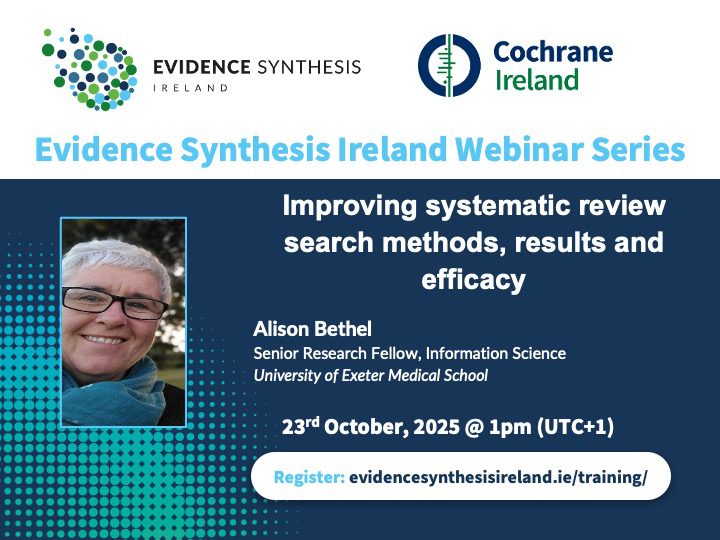
more
Registration
CLICK HERETime
(Thursday) 1:00 pm - 2:00 pm
Location
ONLINE
november 2025
Event Details
To register, CLICK HERE Health technology assessment (HTA) is a multidisciplinary process to determine the value of a health technology to inform decision-making. A HTA comprises
Event Details
To register, CLICK HERE
Health technology assessment (HTA) is a multidisciplinary process to determine the value of a health technology to inform decision-making. A HTA comprises several domains, including clinical effectiveness, epidemiology and economic evaluation, each of which relies on evidence synthesis. When we think of evidence synthesis, we often picture systematic reviews and a formal, well-structured process for gathering and evaluating information. The need to provide a range of timely evidence syntheses on a single topic often requires reliance on data across the spectrum in terms of quality, quantity, and applicability. In this webinar we will discuss some of the challenges in evidence synthesis when the best available evidence may not answer all the questions. Given that a decision maker cannot usually wait for further high quality studies, we will highlight some of the approaches to ensuring that the evidence is presented to address decision uncertainty.
Speakers:
Susan Spillane is one of the Deputy Directors in HIQA’s HTA Directorate, and oversees the function within the Directorate which provides HTA support to the National Screening Advisory Committee. Susan has a background in pharmacy, and postgraduate training in pharmacoepidemiology, statistics, public health, and cancer research, and previously held roles at the National Centre for Pharmacoeconomics, and the National Cancer Institute, USA.
Conor Teljeur is Chief Scientist in HIQA’s Health Technology Assessment Directorate. He has worked in HTA since 2010, working across all domains including developing numerous economic models. He also contributed to several European methodological guidelines. Before HIQA, he worked for 12 years as a health services researcher in the Department of Public Health and Primary Care in Trinity College Dublin, with a particular interest in deprivation and spatial analysis.

more
Registration
CLICK HERETime
(Thursday) 1:00 pm - 2:00 pm
Location
ONLINE
december 2025
Event Details
Health care policy and practice decisions should be based on a synthesis of the global body of evidence rather than relying on individual studies. Cochrane Ireland and Evidence
Event Details
Health care policy and practice decisions should be based on a synthesis of the global body of evidence rather than relying on individual studies. Cochrane Ireland and Evidence Synthesis Ireland promote evidence based healthcare policy and practice by supporting high quality, relevant systematic reviews and other synthesised research evidence. This workshop provides authors, actively involved in conducting a systematic review, with confidence to assess a wide range of data types. It offers an insight into more complex methods of meta-analysis.
Date: 1st, 2nd, 8th & 9th December 2025
Time: 10.00 am – 1.00 pm
Places: 20 places available for individuals who are resident on the island of Ireland
Fee: €150 General & €80 Student
Target audience
Healthcare professionals, academics, researchers, decision makers and Evidence Synthesis Ireland fellows who are actively involved in performing a systematic review.
Prerequisites
Participants should at least have completed their review protocol, developed and conducted their search strategy and begun data extraction and analysis.
Learning outcomes
In this course participants will be enabled to:
- Understand how to identify, extract and analyse dichotomous and continuous data
- Understand more complex meta-analysis methods including use of Generic Inverse Variance Meta-analysis
- Understand principles of analysis of multi-arm trials, cluster and cross-over trial designs
Teaching strategies
This course consists of online workshops with of a mixture of short presentations, small group activities and practical demonstrations using Cochrane software (RevMan Web). In addition, participants will have access to Cochrane Interactive Learning modules and will be required to complete a set of modules prior to workshops. Access to the Cochrane Interactive Learning modules will be made available for 4 weeks before and 4 weeks after the workshop and will be free of charge thanks to the support of Cochrane Training.
Facilitators
Prof. Valerie Smith, Professor of Midwifery, University College Dublin
Dr Nuala Livingstone, Senior Quality Assurance Editor, Cochrane Editorial & Methods Department
*If your type of ticket is sold out, please join the waitlist or contact us at esi@universityofgalway.ie
more
Additional Information
Click HereRegistration
Click HereTime
1 (Monday) 10:00 am - 9 (Tuesday) 1:00 pm
Location
ONLINE
04dec2:00 pm3:30 pmWebinar: Prof. Gordon Guyatt - Core GRADE: Part One2:00 pm - 3:30 pm ONLINE
Event Details
To register, CLICK HERE GRADE is the world wide standard for rating certainty of evidence in systematic reviews and moving from evidence to recommendations in clinical
Event Details
To register, CLICK HERE
GRADE is the world wide standard for rating certainty of evidence in systematic reviews and moving from evidence to recommendations in clinical practice guidelines. GRADE has, however, become too complicated and the over 50 authoritative GRADE papers are disorganized and increasingly difficult to navigate. In a series of 7 papers published in the BMJ, Gordon Guyatt has led a group of GRADE experts in produce Core GRADE, the essentials of the GRADE process for paired comparisons of interventions. The series provides systematic reviewers and guideline developers with a clear and straightforward guide that includes all they need to produce rigorous systematic reviews and guidelines based on the GRADE process.This first of two webinars will provide an overview of the Core GRADE approach and deal with issues choosing the target of certainty rating, and addressing issues of precision and risk of bias.
Speaker:
Gordon Guyatt is a McMaster University Distinguished Professor. His work has focused on Evidence-based Medicine. His work has included a key role in the creation of GRADE approach to systematic reviews and practice guidelines, and most recently a series of papers on the essentials of GRADE, Core GRADE in the BMJ. He has published over 1,000 papers many in the top journals and is one of the world’s most cited scientists.
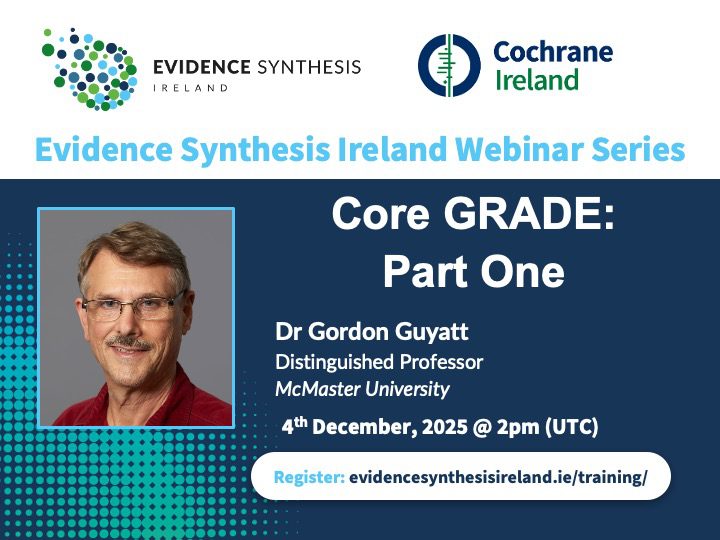
more
Registration
CLICK HERETime
(Thursday) 2:00 pm - 3:30 pm
Location
ONLINE
january 2026
29jan2:00 pm3:30 pmWebinar: Prof. Gordon Guyatt - Core GRADE: Part Two2:00 pm - 3:30 pm ONLINE
Event Details
To register, CLICK HERE GRADE is the world wide standard for rating certainty of evidence in systematic reviews and moving from evidence to recommendations in clinical
Event Details
To register, CLICK HERE
GRADE is the world wide standard for rating certainty of evidence in systematic reviews and moving from evidence to recommendations in clinical practice guidelines. GRADE has, however, become too complicated and the over 50 authoritative GRADE papers are disorganized and increasingly difficult to navigate. In a series of 7 papers published in the BMJ, Gordon Guyatt has led a group of GRADE experts in produce Core GRADE, the essentials of the GRADE process for paired comparisons of interventions. The series provides systematic reviewers and guideline developers with a clear and straightforward guide that includes all they need to produce rigorous systematic reviews and guidelines based on the GRADE process.This second of two webinars will deal with Core GRADE’s approach to inconsistency, indirectness, and moving from evidence to recommendations.
Speaker:
Gordon Guyatt is a McMaster University Distinguished Professor. His work has focused on Evidence-based Medicine. His work has included a key role in the creation of GRADE approach to systematic reviews and practice guidelines, and most recently a series of papers on the essentials of GRADE, Core GRADE in the BMJ. He has published over 1,000 papers many in the top journals and is one of the world’s most cited scientists.
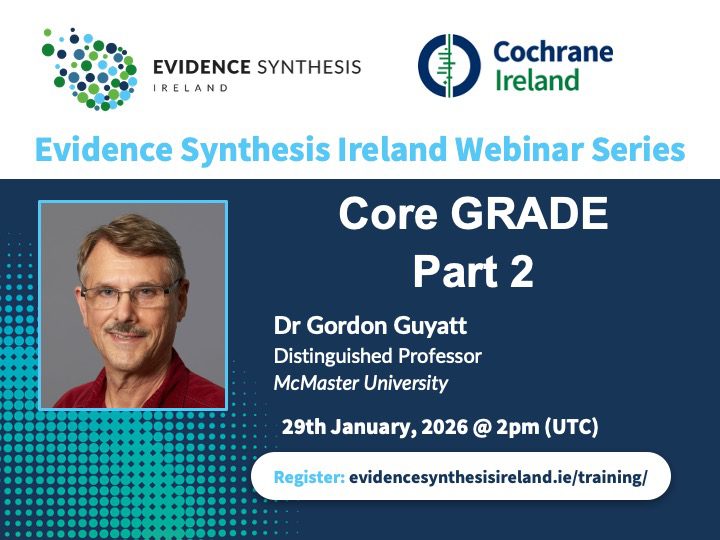
more
Registration
CLICK HERETime
(Thursday) 2:00 pm - 3:30 pm
Location
ONLINE
february 2026
Event Details
To register, CLICK HERE Systematic reviews of randomized controlled trials (RCTs) aim to include all eligible studies in evidence synthesis. Unfortunately, it is now clear that
Event Details
To register, CLICK HERE
Systematic reviews of randomized controlled trials (RCTs) aim to include all eligible studies in evidence synthesis. Unfortunately, it is now clear that many systematic reviews contain so-called problematic studies. A study could be problematic due to research misconduct (including falsification or fabrication of data) or otherwise due to critical errors. Regardless of the reason for the problems, it is important to identify and remove these studies from systematic reviews to prevent them from influencing healthcare decisions. The INSPECT-SR (INveStigating ProblEmatic Clinical Trials in Systematic Reviews) tool has been developed for the purpose of assessing trustworthiness of RCTs in order to identify problematic trials. This interactive webinar will introduce the INSPECT-SR tool by way of application to a published clinical trial. Participants will have the opportunity to use INSPECT-SR to perform trustworthiness checks themselves and will learn how the tool can be incorporated when undertaking a systematic review.
Speaker:
Jack Wilkinson is a Senior Lecturer in Clinical Trials at University of Manchester. His research interests include clinical trials and evidence synthesis, and he is Statistical Editor for Cochrane Gynaecology and Fertility. He has extensive experience in the conduct of integrity investigations for journals and publishers, and he leads the INSPECT-SR project, which developed a tool for the assessment of trial trustworthiness.
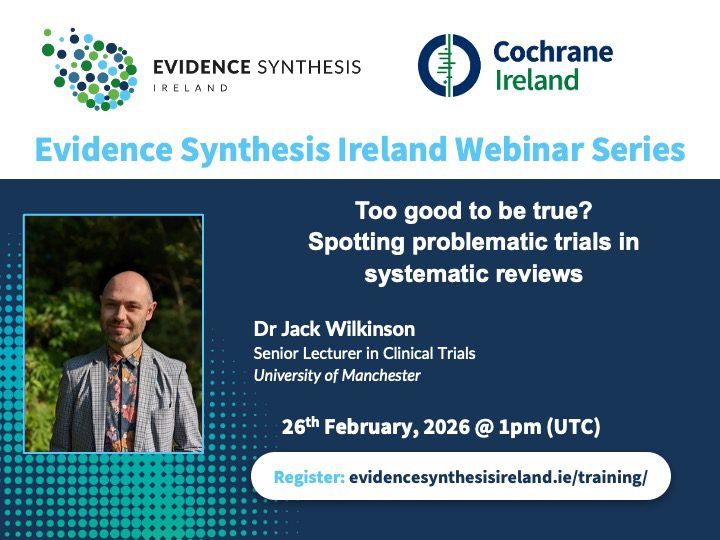
more
Registration
CLICK HERETime
(Thursday) 1:00 pm - 2:00 pm
Location
ONLINE
If you find the charge for places a barrier to attending:
- Please let us know as complimentary places can be made available in certain circumstances
- For example, eligibility: public, patients or carers not affiliated/supported by an organisation, unemployed and fully retired people with no paid work e.g.
- We have limited free places for individuals from low to middle income countries on online workshops
- Concessions are not offered to businesses, individuals funded by an organisation, or large companies.
- Email esi@universityofgalway.ie for more details




